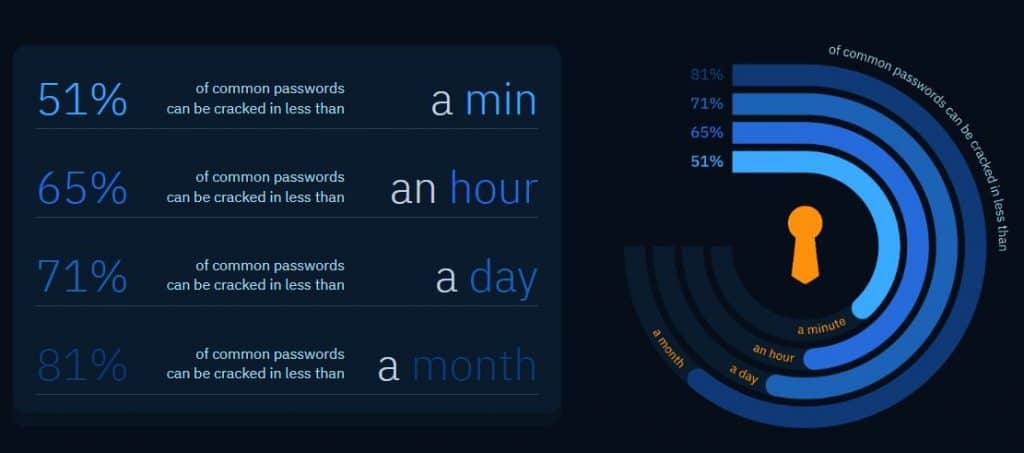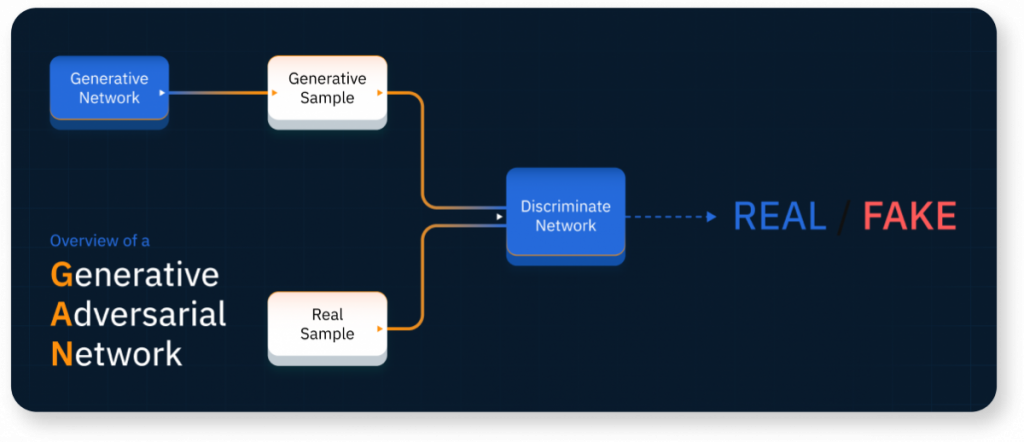PassGAN: The New AI Can Crack Passwords in Less Than Half a Minute

In Brief
PassGAN, a password-cracking AI developed by Home Security Heroes, can crack passwords in less than half a minute, 65% in less than an hour, 71% within a day, and 81% within a month.
PassGAN is a worrying development in password cracking methods, as it does away with manual password analysis and uses a Generative Adversarial Network (GAN) to autonomously learn the distribution of genuine passwords from actual password breaches.
PassGAN can provide numerous password attributes and enhance projected password quality, making it simpler for hackers to guess your passwords and access your personal information.
Artificial Intelligence (AI) technology has been advancing at a rapid pace and is now able to do many things that were previously thought impossible. An example of such advancement is PassGAN, a password-cracking AI developed by a team of researchers from Home Security Heroes. This AI is scarily effective: It can crack passwords in less than half a minute, much faster than human experts or traditional techniques.

Home Security Heroes has recently released a study showing how effective PassGAN is at password cracking. They found that 51% of passwords were cracked in less than a minute, 65% in less than an hour, 71% within a day, and 81% within a month. With the rise of AI technology, it is becoming nigh impossible to keep your passwords secure.
The main reason that PassGAN can crack passwords so quickly and effectively is that it has the ability to learn from real passwords from real leaks. PassGAN is trained to identify the distribution of passwords and use this information to make faster and more accurate guesses.

To put this into perspective, PassGAN can run through 15,600,000 common passwords and tell you how long it will take the AI to crack your password in under six minutes. Passwords that are longer than 18 characters are generally safe against AI password crackers, as PassGAN would take at least 10 months to crack number-only passwords and 6 quintillion years to crack passwords that contain symbols, numbers, lower-case letters, and upper-case letters.
PassGAN is a worrying development in password-cracking methods. The most recent method does away with manual password analysis by using a Generative Adversarial Network (GAN) to autonomously learn the distribution of genuine passwords from actual password breaches. This increases the speed and effectiveness of password cracking, but it also poses a severe risk to your online security.

PassGAN can provide numerous password attributes and enhance projected password quality, making it simpler for hackers to guess your passwords and access your personal information. So, it is essential to consistently update your passwords to safeguard yourself from password-cracking tech.

Examining the conceptual underpinnings of various contemporary password-guessing techniques is crucial to comprehending how PassGAN operates. Generally, data-driven, straightforward operations are used by password-guessing software. This indicates that they use data models to perform hand-coded password evaluations. Additionally, the tools use password creation techniques like concatenation and make other assumptions about password patterns.
These methods of password guessing are comparatively effective for simple and predictable passwords. Nevertheless, these techniques become either excessively sluggish or entirely unable to crack the security codes when the sample size is big and complicated password patterns are involved. Systems like PassGAN can be used in this situation.
Systems called neural networks teach computers to understand and evaluate data similarly to the human mind. The neural networks used by GAN are made to record a range of structures and attributes. The RockYou dataset, a set of data used to train intelligent systems on password analysis, was utilized for training PassGAN. Following training, GAN could use the learned information to produce fresh examples of passwords that adhere to the neural network distribution.
How Should You Secure Your Passwords?
Maintaining the confidentiality of your passwords is crucial. Regrettably, numerous password database dumps have shown that people prefer using less complicated, simpler passwords. What can you do to ensure your password is secure enough to protect you from hackers? Let’s look at a few of the top password security options.
The key distinction between a secure password and one that is simple to crack is password strength. According to the information, researchers got by running password samples on PassGAN, a digit-only password with 10 characters can be cracked in a matter of seconds.
A ten-letter mixed-case password would take four weeks to crack, but a ten-letter password with only lowercase characters would take an hour. On the other hand, it would take five years to crack a ten-character strong password made up of letters, symbols, and integers.
Changing your password every three to six months is an important step you can take to keep your account secure. Change your password right away to prevent security breaches if you believe someone may have accessed your account or that you may have given your password to someone you shouldn’t have.
It is clear that traditional forms of password cracking are no match for PassGAN. This AI can crack any password in less than half a minute, making it essential that individuals implement strong password-protection measures. With AI always advancing and creating more effective methods, it will become increasingly difficult to keep passwords secure.
- Microsoft’s VALL-E has been touted as a tool to improve people’s lives, but it now appears to be the most dangerous scam software ever released. Vall-E is a synthetic voice that can be used to imitate real people and is made using a recording of a real person’s voice and a Microsoft code. It can be used to scam people out of money by imitating a friend’s voice or the voice of a celebrity.
- Experts in Finland believe that attackers will soon begin to use AI to carry out deadly effective phishing attacks. WithSecure, the Finnish Transport and Communications Agency, and the Federal Emergency Management Agency have prepared a report analyzing current trends and developments in AI, cyberattacks, and where the two intersect. AI-powered cyber-attacks will be particularly effective regarding impersonation techniques, often used in phishing and vishing attacks. Hackers are already using AI to automate their attacks and use ChatGPT chatbots to carry out social engineering attacks.
Read more about AI:
Disclaimer
In line with the Trust Project guidelines, please note that the information provided on this page is not intended to be and should not be interpreted as legal, tax, investment, financial, or any other form of advice. It is important to only invest what you can afford to lose and to seek independent financial advice if you have any doubts. For further information, we suggest referring to the terms and conditions as well as the help and support pages provided by the issuer or advertiser. MetaversePost is committed to accurate, unbiased reporting, but market conditions are subject to change without notice.
About The Author
Damir is the team leader, product manager, and editor at Metaverse Post, covering topics such as AI/ML, AGI, LLMs, Metaverse, and Web3-related fields. His articles attract a massive audience of over a million users every month. He appears to be an expert with 10 years of experience in SEO and digital marketing. Damir has been mentioned in Mashable, Wired, Cointelegraph, The New Yorker, Inside.com, Entrepreneur, BeInCrypto, and other publications. He travels between the UAE, Turkey, Russia, and the CIS as a digital nomad. Damir earned a bachelor's degree in physics, which he believes has given him the critical thinking skills needed to be successful in the ever-changing landscape of the internet.
More articles

Damir is the team leader, product manager, and editor at Metaverse Post, covering topics such as AI/ML, AGI, LLMs, Metaverse, and Web3-related fields. His articles attract a massive audience of over a million users every month. He appears to be an expert with 10 years of experience in SEO and digital marketing. Damir has been mentioned in Mashable, Wired, Cointelegraph, The New Yorker, Inside.com, Entrepreneur, BeInCrypto, and other publications. He travels between the UAE, Turkey, Russia, and the CIS as a digital nomad. Damir earned a bachelor's degree in physics, which he believes has given him the critical thinking skills needed to be successful in the ever-changing landscape of the internet.



















































